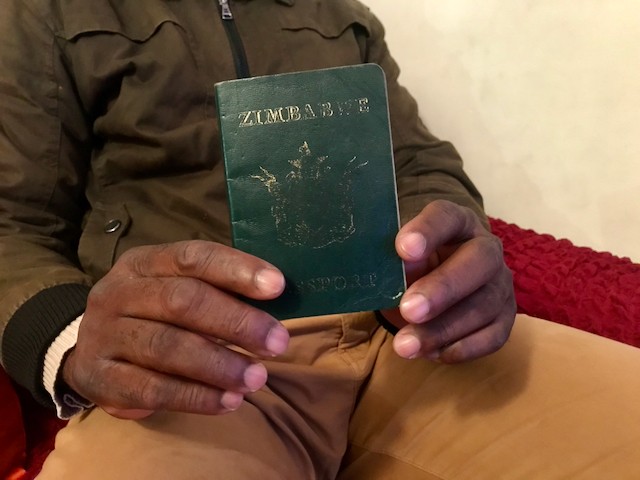Operation Dudula and other latecomers to the ZEP litigation are muddying the waters
The court challenge to the termination of the Zimbabwe Exemption Permit will be heard in April
The Helen Suzman Foundation’s challenge to the termination of the Zimbabwean Exemption Permit is to be heard between 11 and 14 April this year. Archive photo: Tariro Washinyira
Last week, the Pretoria High Court heard applications from the All Truck Drivers Forum and Allied South Africa (ATDFASA) and Operation Dudula to intervene in the Helen Suzman Foundation’s (HSF) review of government’s decision to terminate the Zimbabwe Exemption Permit (ZEP).
HSF’s case is set to be heard between 11 and 14 April this year, alongside two similar applications from the Zimbabwean Exemption Permit Holders Association and the Zimbabwean Immigration Federation.
ATDFSA and Operation Dudula sought to join proceedings to offer belated support for government’s decision, which if upheld in April would spell disaster for 178,000 ZEP holders and their families.
Despite making headlines last month for lawlessly removing migrant children from their schools, Operation Dudula shamelessly described itself in its court papers as “a civil rights movement whose main objective is to fight crime and criminality using legal protests and court applications”.
For their part, Operation Dudula hoped to join April’s proceedings to argue that ZEP holders contribute to “the already dire situation of criminality” in South Africa.
ATDFSA used its application to peddle myths about migrants in South Africa, seeking to argue that the ZEP’s very existence contributes “to the proliferation of illegal undocumented drivers in the trucking industry”.
HSF opposed both applications for their lack of factual basis and their deliberate attempt at muddying the real issue before the court come April: that Minister of Home Affairs Aaron Motsoaledi terminated the ZEP without consulting its holders, nor measuring the decision’s impact on them or the South African society in which they have lawfully lived for more than a decade.
In a judgment delivered on 10 February 2023, Operation Dudula’s application to intervene was refused, but ATDFSA was allowed to make its voice heard in April’s proceedings.
Nonetheless, the intervention applications together provide an opportunity to once more dispel common myths that drive xenophobic sentiment in South Africa, which generally begin with exaggerated claims about the number of migrants living here. This, despite StatsSA revealing in their latest estimates that roughly four million migrants live in South Africa.
A recent report by the Institute for Security Studies confirms that this amounts to roughly 6.5% of our population – a figure in line with international population trends.
Operation Dudula’s claims about migrant criminality are easily debunked by government’s own data. In response to parliamentary questioning, Minister of Justice Ronald Lamola said that in 2021, out of a prison population of 135,476, only 3,534 were foreign nationals – just 2.6%. And, these figures do not differentiate between documented or undocumented foreign nations nor do they specify their nationality.
In any event, it is very unlikely that ZEP holders would be among these numbers. The ZEP is the third iteration of a permit that first began as the Dispensation for Zimbabwe Permit (DZP) in 2009. In order to qualify for the DZP and its successors applicants had to present Home Affairs with a clean criminal record. So, as unfounded as it is to believe that migrants in general drive South Africa’s crime rates, it is even less plausible to believe that ZEP holders do so.
ATDFSA’s argument that the ZEP incentivises illegal employment in the trucking industry does not fare much better – in fact it flounders on its own terms. In its application, ATDFSA points to a raft of legislation that it rightly claims prevents employers from hiring illegal foreigners – the Employment Equity Act, the Broad-based Economic Empowerment Act, the Employment Services Act and the Immigration Act. In a context of such overwhelming legal protection for South African workers from undocumented competition, there is no need to scapegoat, as ATDFSA does, that small subset of legal migrants that are ZEP holders.
With unfounded populist claims like those of ATDFSA and Operation Dudula leaping out of South Africa’s deteriorating political dialogue and finding expression in our courtrooms, one may worry about how far incendiary anti-migrant sentiment in South Africa has come – and how far it can go, if left unopposed.
For those who expect much better from South Africa, the battle over the ZEP is an important case. Its termination is not simply a harbinger of extreme life-altering hardship for its holders but also an acute instance of non-deliberative and irrational government decision-making that has no place in a country of laws.
Views expressed are not necessarily those of GroundUp
Next: Hundreds stranded in Eastern Cape village after bridge collapses during torrential rains
Previous: Ladysmith substation repair could take up to two months to complete
© 2023 GroundUp. This article is licensed under a Creative Commons Attribution-NoDerivatives 4.0 International License.
You may republish this article, so long as you credit the authors and GroundUp, and do not change the text. Please include a link back to the original article.
We put an invisible pixel in the article so that we can count traffic to republishers. All analytics tools are solely on our servers. We do not give our logs to any third party. Logs are deleted after two weeks. We do not use any IP address identifying information except to count regional traffic. We are solely interested in counting hits, not tracking users. If you republish, please do not delete the invisible pixel.



